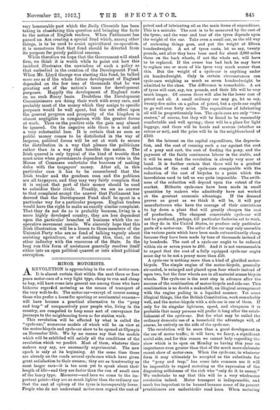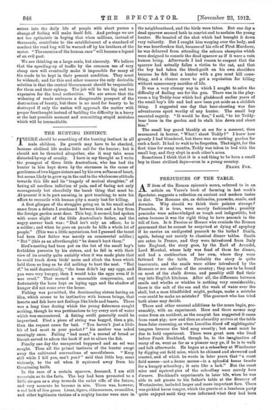MINOR MOTORISTS. A REVOLITTION is approaching in the use of motor-cars.
It is almost certain that within the next three or four years motor-cars of a very light type, cheap to run and cheap to buy, will have come into general use among those who have hitherto regarded motoring as the means of transport of the very well-to-do. The motor-car—except of course among those who prefer a horse for sporting or sentimental reasons— will have become a practical alternative to the "pony and trap " of comparatively poor people who, living in the country, are compelled to keep some sort of conveyance for journeys to the neighbouring town oe for station work.
This revolution will be effected by what is called the "cycle-car," numerous models of which will be on view at the motor-bicycle and cycle-car show to be opened at Olympia on November 25th. We by no means say that the models which will be exhibited will satisfy all the conditions of the revolution which we predict. Most of them, whatever their makers may say, are necessarily experimental. The new epoch is only at its beginning. At the same time there are already on the roads several cycle-cars which have given great satisfaction to their owners; they are as trustworthy as most larger cars—it is too soon yet to speak about their length of life—and they are faster than the run of small cars of the heavy type. Moreover—and here we come to the im- portant point—they are so much lighter than the ordinary car that the cost of upkeep of the tyres is incomparably lower. People who do not understand motor-care regard the cost of
petrol and of lubricating oil as the main items of expenditure. This is a mistake. The cost is to be measured by the cost of the tyres; and the wear and tear of the tyres depends upon the weight of the car. Take even a small car, as the old way of reckoning things goes, and put the weight at fifteen hundredweight. A set of tyres costs, let us say, twenty pounds, and after they have been used for about 3,000 miles those on the back wheels, if not the whole set, will have to be replaced. If the owner has bad luck he may have to replace one or more of his tyres very much sooner than this. But the weight of a cycle-car is anything under six hundredweight. Only in certain circumstances can cycle-cars weighing as much as seven hundredweight be admitted to the class. The difference is remarkable. A set of tyres will cost, say, ten pounds, and their life will be very much longer. Of course there will also be the lower coat of petrol and oil. A small ordinary car may go, let us say, twenty-five miles on a gallon of petrol, but a cycle-car ought to go well over forty miles. The expenditure of lubricating oil will be proportionately less. The cycle-cars are only "two- seaters," of course, but they will be found to be reasonably comfortable and well sprung ; there will be a place for light luggage, and there will be hoods and screens (whether as extras or not), and the price will be in the neighbourhood of £100.
Set the interest on the capital expenditure, the deprecia- tion, and the cost of running such a car against the cost of a pony and cart, the cost of feeding the pony, and the payment of the fairly continuous labour in the stable, and it will be seen that the revolution is already very near at hand. It is further certain that there will be a gradual reduction of the cost of cycle-cars comparable with the reduction of the cost of bicycles to a point which the incredulous used to tell us was quite impossible. The swift- ness of the reduction will depend upon the extent of the market. Hitherto cycle-cars have been made in small quantities by makers who admittedly have not worked at the greatest economic advantage. If the demand proves as great as we think it will be, it will pay manufacturers who have the courage of their convictions to lay down a plant that will greatly cheapen the cost of production. The cheapest conceivable cycle-car will not be produced, perhaps, till particular factories set to work, as they do in the United States, to produce only particular parts of a motor-car. The seller of the car may only assemble the various parts which have been made extraordinarily cheap because they have been made by tens of thousands instead of by hundreds. The cost of a cycle-car ought to be reduced within six or seven years to £60. And it is not unreasonable to expect that the cost of a fully equipped cycle-car ought some day to be not a penny more than £50.
A cycle-car is nothing more than a kind of glorified motor- bicycle. The simple engine of the motor-bicycle, generally air-cooled, is enlarged and placed upon four wheels instead of upon two, but the four wheels are in all material senses bicycle wheels. The cycle-car is the next step in advance after the success of the combination of motor-bicycle and side-car. This combination is no doubt a makeshift, an illogical arrangement with the engine pulling in a lopsided manner. Yet some illogical things, like the British Constitution, work remarkably well, and the motor-bicycle with a side-car is one of them. If only for its singular lightness, speed, and cheapness it is probable that many persons will prefer it long after the estab- lishment of the cycle-car. But for what may be called the ordinary domestic use of a household the advantage will, of course, be entirely on the side of the cycle-ear.
The revolution will be more than a great development in the use of motor traffic; it will have, we fancy, a significant social side, and for this reason we cannot help regarding the show which is to open on Monday as having this year an importance even greater than that of the much more elaborate recent show of motor-cars. When the cycle-car, in whatever form it may ultimately be accepted as the substitute for the "pony and trap," has come into common use it will be impossible to regard motoring as the expression of the disgusting selfishness of the rich who "only do it to annoy." We undertake to say that this will be a very wholesome revolution indeed. Motor transport is indispensable, and much too important to be banned because some of its present practitioners are widonbtedlv road hove. When motoring
enters into the daily life of people with short purses a change of feeling will make itself felt. And perhaps we are not too optimistic in hoping that when millions, instead of thousands, contribute to the establishment of a standard of conduct the road hog will be warned off by his brothers of the motor. " The enemies of the human race " will become a legend of an evil past.
We are thinking on a large scale, but sincerely. We believe that the speeding-up of traffic by the common use of very cheap cars will eventually make it impossible for many of the roads to be kept in their present condition. They must be widened; and for this and other reasons the only desirable solution is that the central Government should be responsible for them and their upkeep. The job will be too big and too expensive for the local authorities. We are aware that the widening of roads embraces a disagreeable prospect of the destruction of beauty, but there is no need for beauty to be destroyed if only the nation will approach the matter with proper forethought instead of tackling the difficulty in a hurry at the last possible moment and committing stupid mistakes which will be irremediable.















































 Previous page
Previous page